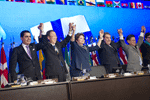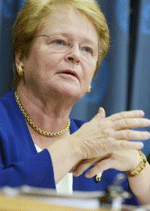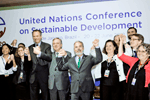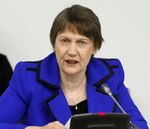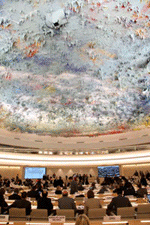Rio 2012
| Published on Fri, 2012-07-13 10:30 |
Published on Thu, 2012-07-05 12:26
The recent Rio2012 Summit upheld the right of all people to food, and the need to support small farmers and promote ecologically-sound agriculture, reported Martin Khor, executive director of South Centre, in his most recent column for The Star, one of the leading Malaysian newspapers. |
Published on Thu, 2012-06-28 08:58
Governments show a reasonable satisfaction on the delicate balance achieved in the outcome document for the United Nations Conference on Sustainable Development (Rio2012). But many of them are also deeply disappointed with the lack of ambition in the section on the means of implementation, considered a step backwards by some negotiators, according to the analysis of the Third World Network (TWN). |
Published on Thu, 2012-06-28 08:56
Women rights organizations expressed deep disappointment and outrage over “The Future We Want”, the outcome document approved by the United Nations Conference on Sustainable Development (Rio2012) held last week in Brazil, reported Inter Press Service news agency (IPS). “The omission of reproductive rights” is “a step backwards from previous agreements,” said former prime minister of Norway Gro Harlem Brundtland. According to IPS United Nations Bureau Chief Thalif Deen, the comparison with the 1992 Agenda 21 was inevitable. |
Published on Thu, 2012-06-21 17:38
More than 100 heads of State and government prepare to approve on Friday in Rio de Janeiro, Brazil, the outcome document of the United Nations Conference on Sustainable Development (Rio2012). After intensive and protracted informal negotiations, representatives of 191 countries reached an agreement on Tuesday. |
Published on Thu, 2012-06-21 17:31
A high-level forum at the UN Conference on Sustainable Development (Rio2012) offered this week an opportunity to debate how to measure the social progress of the countries and the whole world without merely depending on economic indicators, and assessing at the same time the damage caused by human activities to the well-being of the future generations. |
Published on Wed, 2012-06-20 19:33
Five leading civil society international networks urged the European Union (EU) head of State and Government to “demonstrate a commitment” to ensure at Rio2012 “that policies and practices pursued” within and outside the bloc “are consistent with the principles of sustainable development”. |
|
Published on Fri, 2012-06-15 20:10
by Roberto Bissio |
|
Published on Tue, 2012-06-05 08:04
A National Civil Society Consultation on the United Nations Conference on Sustainable Development (Rio2012) was organized in Kathmandu by Rural Reconstruction Nepal (RRN, focal point of Social Watch), in collaboration with the National Planning Commission and the International Centre for Integrated Mountain Development. |
Published on Thu, 2012-04-12 08:34
Twenty-two independent experts and special rapporteurs of the United Nations Human Rights Council called on the states to incorporate universally agreed international human rights norms and standards with strong accountability mechanisms into the goals to be agreed at the UN Conference on Sustainable Development (Rio2012) to be held in June. The appeal coincides with long-standing proposals made by civil society organizations. The petition includes the setting of “indicators and measures to evaluate implementation of the commitments” to be agreed in Rio de Janeiro “through an inclusive, transparent and participatory process with all relevant stakeholders, including civil society”, wrote the experts in an open letter. |
SUSCRIBE TO OUR NEWSLETTER


